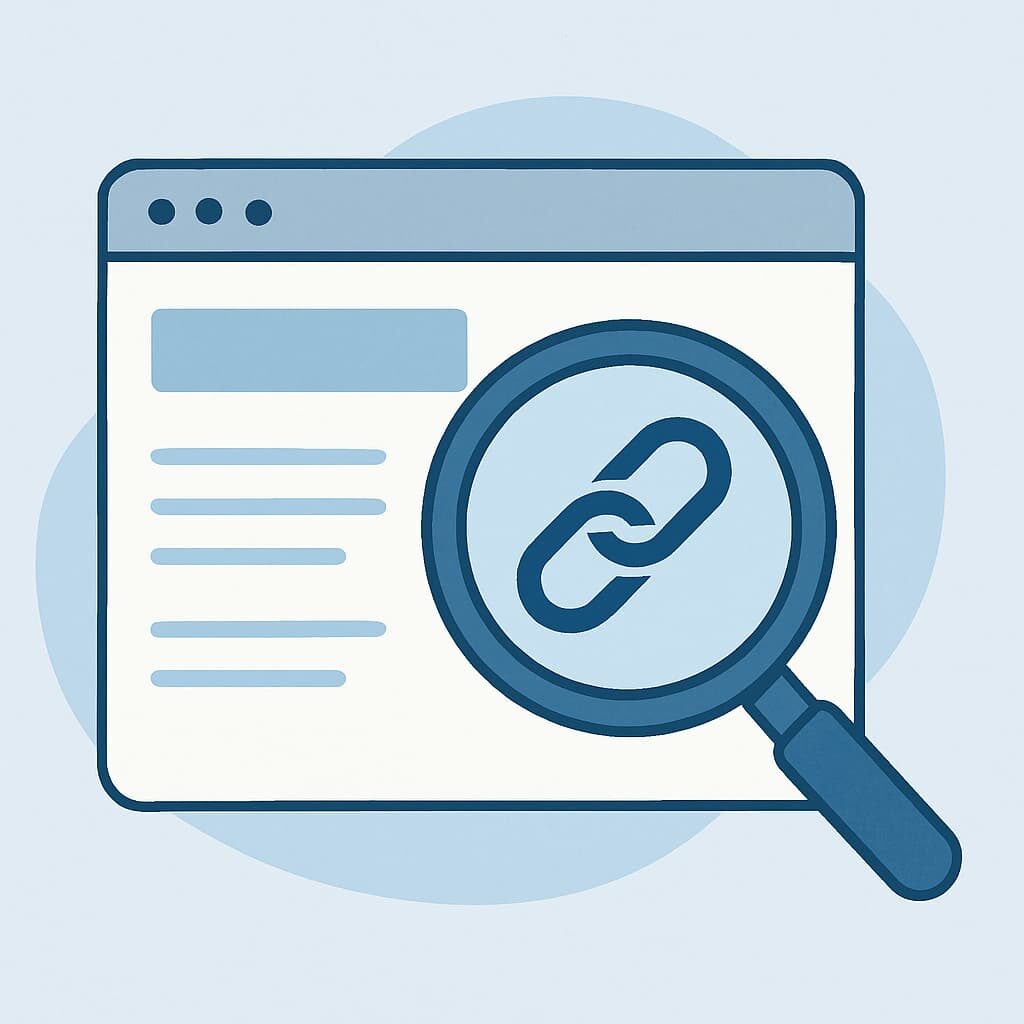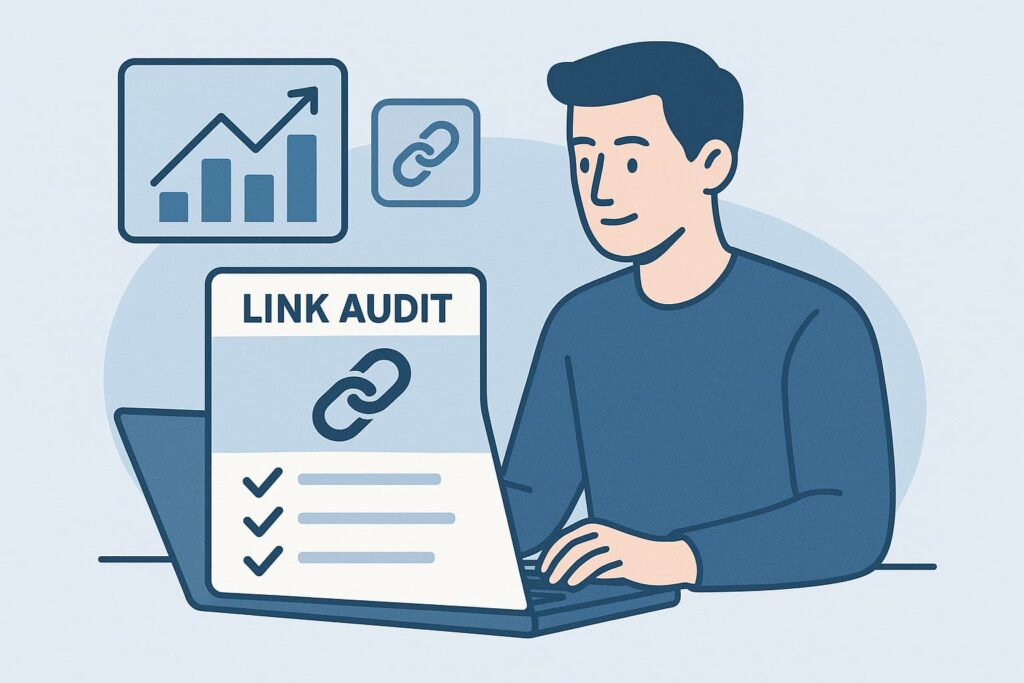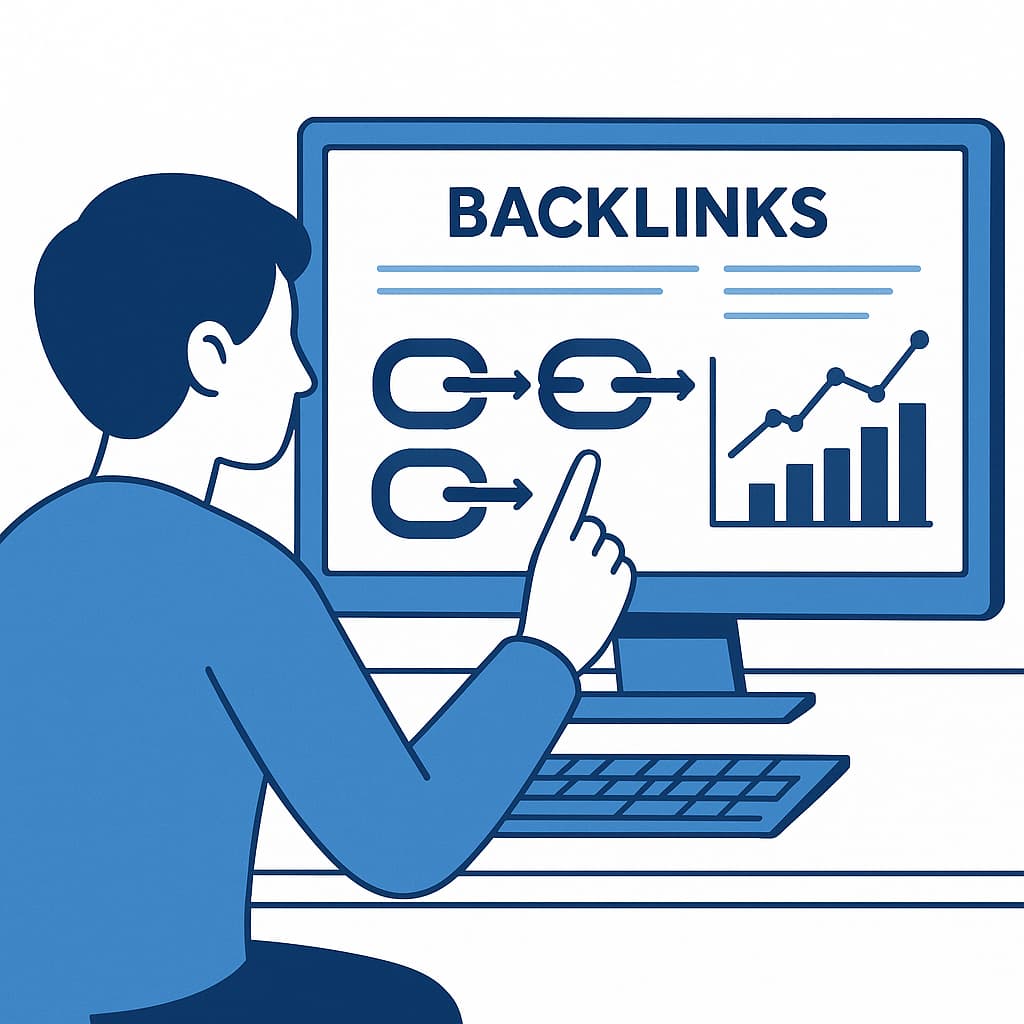High-quality backlinks remain essential for SEO success, but poor-quality links can negatively impact your rankings. A thorough link audit helps identify harmful backlinks, evaluate your overall link profile strength, and reveal opportunities for strategic improvements.
While basic DIY audits are possible, professional audits deliver greater accuracy and efficiency. Partnering with experts ensures your link-building efforts align with long-term SEO goals while mitigating risks to your search visibility.
What Is a Link Building Audit?
A link-building audit is a detailed review of all backlinks pointing to your website. The goal is to:
- Identify harmful or spammy links that could trigger search engine penalties.
- Evaluate link quality based on domain authority, relevance, and anchor text.
- Find new link-building opportunities.
- Ensure compliance with search engine guidelines.
Ignoring a proper link audit puts your website in real danger. Google’s algorithms, like Penguin, can hit you with penalties if they spot shady backlink patterns, dropping your rankings overnight. Even if you avoid penalties, low-quality links slowly damage your site’s authority, making it harder to rank over time.
Worse, you could waste money on useless link-building efforts while missing the strategies that actually work. A professional audit uncovers those hidden opportunities. Bottom line? Regular link audits aren’t optional—they’re critical for keeping your search visibility strong.
The Importance of a Link Building Audit
A link-building audit examines a website’s backlink profile to identify risks and opportunities. The process includes:
- Toxic Link Identification – Detection of spammy or penalized backlinks that may trigger Google penalties.
- Backlink Profile Analysis – Evaluation of backlink quality, diversity, and authority.
- Competitor Benchmarking – Comparison of backlink profiles against competitors to identify gaps.
- Disavow & Cleanup Recommendations – Actionable steps for removing or disavowing harmful links.
- Link Acquisition Strategy – Identification of high-quality link-building opportunities.
Incorrect audits may fail to detect toxic links, recommend unnecessary disavows, or waste resources on ineffective strategies. Professional audits prevent these errors.
Why DIY Link Audits Are Ineffective
Most free tools—like Google Search Console—only give surface-level link data. To really audit backlinks correctly, you need expert knowledge, better tools, and a solid grasp of SEO. Skip that, and you could tank your rankings with costly mistakes.
1. Limited Data from Free Tools
Free tools give you basic info like domain authority and backlink counts, but they miss the details that really matter. For example, they can’t tell the difference between legit earned links and paid links, which is a big deal if you want to stay on Google’s good side.
They also don’t track how backlinks have changed over time, so spotting shady link-building tactics becomes much harder. And when you try to compare your backlinks with competitors, the data just isn’t good enough to make smart decisions.
2. Risk of Misinterpreting Data
Trying to analyze your backlink profile without proper expertise can lead to serious SEO missteps. One of the most common errors is incorrectly labeling links — you might flag harmless, low-quality links as toxic and unnecessarily disavow them, while overlooking truly dangerous links that should be removed.
Another critical oversight is failing to spot unnatural anchor text patterns. When too many links use identical commercial keywords, search engines may view this as manipulation, potentially triggering penalties.
Perhaps most dangerously, inexperienced analysts often miss sudden backlink spikes. These rapid increases are frequently caused by spammy or paid links, and if undetected, they can put your entire site at risk of search engine penalties. Without the right knowledge, what seems like simple data analysis can actually make your SEO problems worse.
3. Time-Consuming Manual Review
Manually reviewing thousands of backlinks is an inefficient and error-prone process. Free tools do not provide advanced filtering or prioritization, forcing businesses to sift through large volumes of data without clear direction.
In contrast, professionals use specialized software that automates initial screenings, flagging suspicious links for further human review. This hybrid approach saves time while ensuring higher accuracy in identifying harmful or low-quality backlinks.
4. Incorrect Use of the Disavow Tool
The Google Disavow Tool can be useful but carries risks. Using it incorrectly may remove good backlinks by mistake, hurting search rankings. Many companies disavow links they shouldn’t, either because they misidentify them or are too cautious.
SEO professionals know which links actually need disavowing — like those from spam sites or penalized domains — and which should stay to preserve search rankings. Without this knowledge, businesses might accidentally damage their backlink profile.
Benefits of Hiring a Professional for a Link Audit
Many businesses underestimate how complex backlink analysis can be. They often rely on free tools or manual checks, which don’t provide enough useful data. A professional link audit, done by experienced SEO specialists, gives a complete evaluation of a website’s backlinks. It ensures the site follows search engine guidelines and finds ways to improve its backlink profile.
1. Access to Advanced Tools and Data
Professional SEOs use premium tools such as Ahrefs, SEMrush, and Majestic, which offer far deeper insights than free alternatives. These tools provide:
- Accurate toxic link detection, identifying spammy, penalized, or manipulative backlinks that could harm rankings.
- Historical backlink tracking, allowing experts to spot unnatural spikes or drops that may indicate algorithmic penalties or negative SEO attacks.
- Competitor backlink analysis, revealing gaps in a site’s link profile and uncovering high-value linking opportunities that competitors are leveraging.
Without these advanced capabilities, businesses risk missing critical issues or misjudging the quality of their backlinks.
2. Actionable Recommendations for Improvement
A professional link audit goes beyond simply flagging bad links—it provides a clear roadmap for improvement. Experts offer strategic guidance, including:
- Effective bad link removal strategies, such as direct outreach to webmasters or using the Google Disavow Tool when necessary.
- Outreach tactics for acquiring high-quality backlinks, such as guest posting, digital PR, and partnerships with authoritative sites.
- Content strategies to attract natural links, such as data-driven research, expert roundups, and in-depth guides that earn editorial backlinks organically.
These recommendations ensure businesses don’t just fix problems but also build a stronger, more sustainable backlink profile.

3. Protection from Search Engine Penalties
Google’s algorithms are constantly evolving, and outdated link-building tactics can easily land your site in hot water, leading to manual penalties or ranking drops. That’s where professional SEO services come in.
Experts know how to spot red flags, like sketchy directory links or an overuse of exact-match anchor text, and clean up your backlink profile to meet Google’s standards. This helps keep your rankings safe from unnatural link penalties.
They also guard against negative SEO, when competitors or malicious actors try to hurt your site by flooding it with spammy backlinks. With proactive monitoring and the right fixes, a good SEO team keeps your rankings (and reputation) secure.
4. Competitive Insights and Strategic Advantages
A professional link audit doesn’t just analyze a business’s own backlinks—it also examines competitors’ link profiles to identify missed opportunities. Experts can:
- Highlight high-authority sites linking to competitors but not to your business, providing targets for outreach.
- Analyze competitor anchor text distribution, ensuring a natural and diverse backlink profile.
- Uncover niche-relevant directories, forums, and news sites where competitors are earning links, offering new avenues for acquisition.
These insights help businesses refine their link-building strategies and outperform competitors in search rankings.
5. Long-Term SEO Growth and Higher Rankings
A good link audit fixes current problems and boosts your site’s authority for long-term results. Cleaning up and optimizing your backlinks improves domain authority, helping you rank for competitive keywords. It also increases organic traffic because search engines prefer sites with high-quality links. This leads to steady growth and reduces dependence on risky or outdated link-building methods.
Unlike short-term fixes, a professional link audit ensures lasting SEO success by following search engine guidelines. It’s a worthwhile investment.
Why Trust Matters in Link Audits
Your backlink profile is too important to leave to chance. A poorly executed audit can do more harm than good, whether it’s unnecessarily disavowing valuable links or missing dangerous ones that could trigger penalties. That’s why choosing who performs your audit matters just as much as doing the audit itself.
Trust in SEO is built on transparency and proven methods. Reliable providers like 3XE Digital and other top specialists prioritize accurate, actionable audits over generic automated reports. The best audits include:
- Multi-source backlink verification
- Manual review of questionable links
- Conservative disavow recommendations
- Clear documentation of findings
This careful approach prevents overcorrection while protecting your search visibility. When evaluating providers, look for case studies that demonstrate real recovery results rather than just promises.
The key is finding an auditor who treats your backlink profile with the same caution they’d apply to their own high-value sites. Rushed or automated audits often create more problems than they solve.
How a Professional Link Audit Works

A complete link audit follows a structured six-step process that combines technical analysis with strategic evaluation. This systematic approach ensures no critical aspects of your backlink profile are overlooked while identifying both risks and opportunities for improvement.
Step 1: Comprehensive Backlink Data Collection
Professional auditors start by gathering backlink data from multiple sources for full coverage. They export links from Google Search Console to see which ones Google recognizes. They pull additional data from premium tools, including Ahrefs, Majestic, and SEMrush to get wider coverage. The team checks historical link data to spot any patterns or sudden changes. Finally, they verify all links are currently active and remove dead links from the analysis.
Step 2: Thorough Link Quality Assessment
Each backlink undergoes rigorous evaluation using multiple criteria:
- Domain Authority Metrics: Checking Domain Rating (DR), Domain Authority (DA), and spam scores
- Contextual Relevance: Ensuring linking sites are topically related to your business
- Anchor Text Analysis: Identifying unnatural patterns (excessive exact-match or commercial anchors)
- Placement Quality: Distinguishing between genuine editorial links and those from low-quality directories, comment spam, or paid placements
- Traffic Potential: Evaluating whether referring domains actually send visitors
Step 3: Precise Toxic Link Identification
Auditors employ multiple verification methods to identify problematic links. They cross-check backlinks against known penalty lists and spam databases. The analysis identifies Private Blog Network (PBN) characteristics including shared IP addresses, duplicate templates, and suspicious whois data. Links originating from penalized or deindexed domains get flagged for review. The process also detects suspicious patterns like sudden traffic spikes or unnatural link velocity. Finally, auditors highlight links coming from irrelevant or low-quality directories and forums that may harm rankings.
Step 4: Strategic Competitor Backlink Analysis
The audit process includes comparing your backlink profile against 3-5 top competitors. This comparison identifies high-authority websites that link to competitors but not to your site. Auditors analyze competitor anchor text distribution to establish what constitutes natural balance in your industry. The review reveals competitors’ most effective link acquisition strategies that could be adapted. Finally, this benchmarking process measures your overall link profile strength against established industry standards for your sector.
Step 5: Disavow and Link Removal Strategy Development
For toxic links that can’t be removed through outreach, auditors:
- Create a prioritized removal outreach list with contact information
- Develop customized disavow files with precise syntax
- Provide documentation of removal attempts for Google
- Recommend keeping borderline links that may still provide value
- Suggest monitoring previously toxic links for improvements
Step 6: Actionable Future Strategy Development
The final audit deliverable provides a prioritized list of high-quality link prospects complete with targeted outreach strategies. It includes a content gap analysis that identifies opportunities to create link-worthy assets, along with recommendations for strategic partnerships and digital PR opportunities.
The report establishes an ongoing monitoring schedule to maintain link profile health and includes a risk assessment framework for future link-building activities. Technical recommendations address improvements to optimize link equity flow throughout the site.
The full audit process typically requires 2-4 weeks to complete, with duration varying based on site size and complexity. Larger enterprises often implement quarterly re-audits and continuous monitoring to sustain optimal backlink profile performance.
Choosing a Reliable Link Audit Provider
A complete link audit is crucial for keeping your backlink profile healthy and avoiding penalties from search engines. But not all audit services deliver the same quality—picking the right one means getting accurate data and practical steps to fix issues.
When choosing a link audit provider, here’s what really matters:
- Real SEO Experience – The team should have strong technical SEO and link analysis skills, with a history of spotting harmful links and boosting rankings.
- Top-Tier Tools – Quality audits rely on trusted tools like Ahrefs, SEMrush, or Majestic to assess backlinks, anchor text, and toxic link risks.
- Straightforward, Useful Reports – The best reports break down findings clearly, prioritizing what to disavow, keep, or fix—no jargon, just actionable advice.
- Proof of Success – Check for case studies or reviews showing real results, like penalty recoveries or ranking jumps.
For businesses seeking a trusted link-building audit service, 3XE Digital offers comprehensive audits backed by advanced tools and data-driven strategies. Their expertise helps businesses identify harmful links, comply with Google’s guidelines, and safeguard their search rankings, making them a strong choice for proactive SEO maintenance.
Conclusion
A professional link building audit is necessary for maintaining a strong backlink profile. While DIY approaches might appear cheaper, they frequently result in incomplete information or overlooked risks. When you hire an expert, you gain accurate identification of damaging links, practical approaches for improving your backlinks, safeguards against search engine penalties, and sustainable SEO improvement. Paying for a professional audit guarantees that your backlinks will help rather than harm your search rankings.



